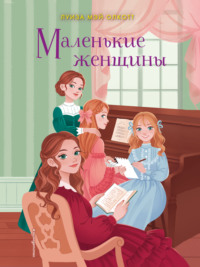 полная версия
полная версияLittle Women: or, Meg, Jo, Beth, and Amy
Sitting on the floor, with one boot on, Amy began to cry, and Meg to reason with her, when Laurie called from below, and the two girls hurried down, leaving their sister wailing; for now and then she forgot her grown-up ways, and acted like a spoilt child. Just as the party was setting out, Amy called over the banisters, in a threatening tone, "You'll be sorry for this, Jo March; see if you ain't."
"Fiddlesticks!" returned Jo, slamming the door.
They had a charming time, for "The Seven Castles of the Diamond Lake" were as brilliant and wonderful as heart could wish. But, in spite of the comical red imps, sparkling elves, and gorgeous princes and princesses, Jo's pleasure had a drop of bitterness in it; the fairy queen's yellow curls reminded her of Amy; and between the acts she amused herself with wondering what her sister would do to make her "sorry for it." She and Amy had had many lively skirmishes in the course of their lives, for both had quick tempers, and were apt to be violent when fairly roused. Amy teased Jo, and Jo irritated Amy, and semi-occasional explosions occurred, of which both were much ashamed afterward. Although the oldest, Jo had the least self-control, and had hard times trying to curb the fiery spirit which was continually getting her into trouble; her anger never lasted long, and, having humbly confessed her fault, she sincerely repented, and tried to do better. Her sisters used to say that they rather liked to get Jo into a fury, because she was such an angel afterward. Poor Jo tried desperately to be good, but her bosom enemy was always ready to flame up and defeat her; and it took years of patient effort to subdue it.
When they got home, they found Amy reading in the parlor. She assumed an injured air as they came in; never lifted her eyes from her book, or asked a single question. Perhaps curiosity might have conquered resentment, if Beth had not been there to inquire, and receive a glowing description of the play. On going up to put away her best hat, Jo's first look was toward the bureau; for, in their last quarrel, Amy had soothed her feelings by turning Jo's top drawer upside down on the floor. Everything was in its place, however; and after a hasty glance into her various closets, bags, and boxes, Jo decided that Amy had forgiven and forgotten her wrongs.
There Jo was mistaken; for next day she made a discovery which produced a tempest. Meg, Beth, and Amy were sitting together, late in the afternoon, when Jo burst into the room, looking excited, and demanding breathlessly, "Has any one taken my book?"
Meg and Beth said "No," at once, and looked surprised; Amy poked the fire, and said nothing. Jo saw her color rise, and was down upon her in a minute.
"Amy, you've got it?"
"No, I haven't."
"You know where it is, then?"
"No, I don't."
"That's a fib!" cried Jo, taking her by the shoulders, and looking fierce enough to frighten a much braver child than Amy.
"It isn't. I haven't got it, don't know where it is now, and don't care."
"You know something about it, and you'd better tell at once, or I'll make you," and Jo gave her a slight shake.
"Scold as much as you like, you'll never see your silly old book again," cried Amy, getting excited in her turn.
"Why not?"
"I burnt it up."
"What! my little book I was so fond of, and worked over, and meant to finish before father got home? Have you really burnt it?" said Jo, turning very pale, while her eyes kindled and her hands clutched Amy nervously.
"Yes, I did! I told you I'd make you pay for being so cross yesterday, and I have, so – "
Amy got no farther, for Jo's hot temper mastered her, and she shook Amy till her teeth chattered in her head; crying, in a passion of grief and anger, —
"You wicked, wicked girl! I never can write it again, and I'll never forgive you as long as I live."
Meg flew to rescue Amy, and Beth to pacify Jo, but Jo was quite beside herself; and, with a parting box on her sister's ear, she rushed out of the room up to the old sofa in the garret, and finished her fight alone.
The storm cleared up below, for Mrs. March came home, and, having heard the story, soon brought Amy to a sense of the wrong she had done her sister. Jo's book was the pride of her heart, and was regarded by her family as a literary sprout of great promise. It was only half a dozen little fairy tales, but Jo had worked over them patiently, putting her whole heart into her work, hoping to make something good enough to print. She had just copied them with great care, and had destroyed the old manuscript, so that Amy's bonfire had consumed the loving work of several years. It seemed a small loss to others, but to Jo it was a dreadful calamity, and she felt that it never could be made up to her. Beth mourned as for a departed kitten, and Meg refused to defend her pet; Mrs. March looked grave and grieved, and Amy felt that no one would love her till she had asked pardon for the act which she now regretted more than any of them.
When the tea-bell rung, Jo appeared, looking so grim and unapproachable that it took all Amy's courage to say meekly, —
"Please forgive me, Jo; I'm very, very sorry."
"I never shall forgive you," was Jo's stern answer; and, from that moment, she ignored Amy entirely.
No one spoke of the great trouble, – not even Mrs. March, – for all had learned by experience that when Jo was in that mood words were wasted; and the wisest course was to wait till some little accident, or her own generous nature, softened Jo's resentment, and healed the breach. It was not a happy evening; for, though they sewed as usual, while their mother read aloud from Bremer, Scott, or Edgeworth, something was wanting, and the sweet home-peace was disturbed. They felt this most when singing-time came; for Beth could only play, Jo stood dumb as a stone, and Amy broke down, so Meg and mother sung alone. But, in spite of their efforts to be as cheery as larks, the flute-like voices did not seem to chord as well as usual, and all felt out of tune.
As Jo received her good-night kiss, Mrs. March whispered gently, —
"My dear, don't let the sun go down upon your anger; forgive each other, help each other, and begin again to-morrow."
Jo wanted to lay her head down on that motherly bosom, and cry her grief and anger all away; but tears were an unmanly weakness, and she felt so deeply injured that she really couldn't quite forgive yet. So she winked hard, shook her head, and said, gruffly because Amy was listening, —
"It was an abominable thing, and she don't deserve to be forgiven."
With that she marched off to bed, and there was no merry or confidential gossip that night.
Amy was much offended that her overtures of peace had been repulsed, and began to wish she had not humbled herself, to feel more injured than ever, and to plume herself on her superior virtue in a way which was particularly exasperating. Jo still looked like a thunder-cloud, and nothing went well all day. It was bitter cold in the morning; she dropped her precious turn-over in the gutter, Aunt March had an attack of fidgets, Meg was pensive, Beth would look grieved and wistful when she got home, and Amy kept making remarks about people who were always talking about being good, and yet wouldn't try, when other people set them a virtuous example.
"Everybody is so hateful, I'll ask Laurie to go skating. He is always kind and jolly, and will put me to rights, I know," said Jo to herself, and off she went.
Amy heard the clash of skates, and looked out with an impatient exclamation, —
"There! she promised I should go next time, for this is the last ice we shall have. But it's no use to ask such a cross-patch to take me."
"Don't say that; you were very naughty, and it is hard to forgive the loss of her precious little book; but I think she might do it now, and I guess she will, if you try her at the right minute," said Meg. "Go after them; don't say anything till Jo has got good-natured with Laurie, then take a quiet minute, and just kiss her, or do some kind thing, and I'm sure she'll be friends again, with all her heart."
"I'll try," said Amy, for the advice suited her; and, after a flurry to get ready, she ran after the friends, who were just disappearing over the hill.
It was not far to the river, but both were ready before Amy reached them. Jo saw her coming, and turned her back; Laurie did not see, for he was carefully skating along the shore, sounding the ice, for a warm spell had preceded the cold snap.
"I'll go on to the first bend, and see if it's all right, before we begin to race," Amy heard him say, as he shot away, looking like a young Russian, in his fur-trimmed coat and cap.
Jo heard Amy panting after her run, stamping her feet and blowing her fingers, as she tried to put her skates on; but Jo never turned, and went slowly zigzagging down the river, taking a bitter, unhappy sort of satisfaction in her sister's troubles. She had cherished her anger till it grew strong, and took possession of her, as evil thoughts and feelings always do, unless cast out at once. As Laurie turned the bend, he shouted back, —
"Keep near the shore; it isn't safe in the middle."
Jo heard, but Amy was just struggling to her feet, and did not catch a word. Jo glanced over her shoulder, and the little demon she was harboring said in her ear, —
"No matter whether she heard or not, let her take care of herself."
Laurie had vanished round the bend; Jo was just at the turn, and Amy, far behind, striking out toward the smoother ice in the middle of the river. For a minute Jo stood still, with a strange feeling at her heart; then she resolved to go on, but something held and turned her round, just in time to see Amy throw up her hands and go down, with the sudden crash of rotten ice, the splash of water, and a cry that made Jo's heart stand still with fear. She tried to call Laurie, but her voice was gone; she tried to rush forward, but her feet seemed to have no strength in them; and, for a second, she could only stand motionless, staring, with a terror-stricken face, at the little blue hood above the black water. Something rushed swiftly by her, and Laurie's voice cried out, —
"Bring a rail; quick, quick!"
How she did it, she never knew; but for the next few minutes she worked as if possessed, blindly obeying Laurie, who was quite self-possessed, and, lying flat, held Amy up by his arm and hockey till Jo dragged a rail from the fence, and together they got the child out, more frightened than hurt.
"Now then, we must walk her home as fast as we can; pile our things on her, while I get off these confounded skates," cried Laurie, wrapping his coat round Amy, and tugging away at the straps, which never seemed so intricate before.
Shivering, dripping, and crying, they got Amy home; and, after an exciting time of it, she fell asleep, rolled in blankets, before a hot fire. During the bustle Jo had scarcely spoken; but flown about, looking pale and wild, with her things half off, her dress torn, and her hands cut and bruised by ice and rails, and refractory buckles. When Amy was comfortably asleep, the house quiet, and Mrs. March sitting by the bed, she called Jo to her, and began to bind up the hurt hands.
"Are you sure she is safe?" whispered Jo, looking remorsefully at the golden head, which might have been swept away from her sight forever under the treacherous ice.
"Quite safe, dear; she is not hurt, and won't even take cold, I think, you were so sensible in covering and getting her home quickly," replied her mother cheerfully.
"Laurie did it all; I only let her go. Mother, if she should die, it would be my fault"; and Jo dropped down beside the bed, in a passion of penitent tears, telling all that had happened, bitterly condemning her hardness of heart, and sobbing out her gratitude for being spared the heavy punishment which might have come upon her.
"It's my dreadful temper! I try to cure it; I think I have, and then it breaks out worse than ever. O mother, what shall I do? what shall I do?" cried poor Jo, in despair.
"Watch and pray, dear; never get tired of trying; and never think it is impossible to conquer your fault," said Mrs. March, drawing the blowzy head to her shoulder, and kissing the wet cheek so tenderly that Jo cried harder than ever.
"You don't know, you can't guess how bad it is! It seems as if I could do anything when I'm in a passion; I get so savage, I could hurt any one, and enjoy it. I'm afraid I shall do something dreadful some day, and spoil my life, and make everybody hate me. O mother, help me, do help me!"
"I will, my child, I will. Don't cry so bitterly, but remember this day, and resolve, with all your soul, that you will never know another like it. Jo, dear, we all have our temptations, some far greater than yours, and it often takes us all our lives to conquer them. You think your temper is the worst in the world; but mine used to be just like it."
"Yours, mother? Why, you are never angry!" and, for the moment, Jo forgot remorse in surprise.
"I've been trying to cure it for forty years, and have only succeeded in controlling it. I am angry nearly every day of my life, Jo; but I have learned not to show it; and I still hope to learn not to feel it, though it may take me another forty years to do so."
The patience and the humility of the face she loved so well was a better lesson to Jo than the wisest lecture, the sharpest reproof. She felt comforted at once by the sympathy and confidence given her; the knowledge that her mother had a fault like hers, and tried to mend it, made her own easier to bear and strengthened her resolution to cure it; though forty years seemed rather a long time to watch and pray, to a girl of fifteen.
"Mother, are you angry when you fold your lips tight together, and go out of the room sometimes, when Aunt March scolds, or people worry you?" asked Jo, feeling nearer and dearer to her mother than ever before.
"Yes, I've learned to check the hasty words that rise to my lips; and when I feel that they mean to break out against my will, I just go away a minute, and give myself a little shake, for being so weak and wicked," answered Mrs. March, with a sigh and a smile, as she smoothed and fastened up Jo's dishevelled hair.
"How did you learn to keep still? That is what troubles me – for the sharp words fly out before I know what I'm about; and the more I say the worse I get, till it's a pleasure to hurt people's feelings, and say dreadful things. Tell me how you do it, Marmee dear."
"My good mother used to help me – "
"As you do us – " interrupted Jo, with a grateful kiss.
"But I lost her when I was a little older than you are, and for years had to struggle on alone, for I was too proud to confess my weakness to any one else. I had a hard time, Jo, and shed a good many bitter tears over my failures; for, in spite of my efforts, I never seemed to get on. Then your father came, and I was so happy that I found it easy to be good. But by and by, when I had four little daughters round me, and we were poor, then the old trouble began again; for I am not patient by nature, and it tried me very much to see my children wanting anything."
"Poor mother! what helped you then?"
"Your father, Jo. He never loses patience, – never doubts or complains, – but always hopes, and works and waits so cheerfully, that one is ashamed to do otherwise before him. He helped and comforted me, and showed me that I must try to practise all the virtues I would have my little girls possess, for I was their example. It was easier to try for your sakes than for my own; a startled or surprised look from one of you, when I spoke sharply, rebuked me more than any words could have done; and the love, respect, and confidence of my children was the sweetest reward I could receive for my efforts to be the woman I would have them copy."
"O mother, if I'm ever half as good as you, I shall be satisfied," cried Jo, much touched.
"I hope you will be a great deal better, dear; but you must keep watch over your 'bosom enemy,' as father calls it, or it may sadden, if not spoil your life. You have had a warning; remember it, and try with heart and soul to master this quick temper, before it brings you greater sorrow and regret than you have known to-day."
"I will try, mother; I truly will. But you must help me, remind me, and keep me from flying out. I used to see father sometimes put his finger on his lips, and look at you with a very kind, but sober face, and you always folded your lips tight or went away: was he reminding you then?" asked Jo softly.
"Yes; I asked him to help me so, and he never forgot it, but saved me from many a sharp word by that little gesture and kind look."
Jo saw that her mother's eyes filled and her lips trembled, as she spoke; and, fearing that she had said too much, she whispered anxiously, "Was it wrong to watch you, and to speak of it? I didn't mean to be rude, but it's so comfortable to say all I think to you, and feel so safe and happy here."
"My Jo, you may say anything to your mother, for it is my greatest happiness and pride to feel that my girls confide in me, and know how much I love them."
"I thought I'd grieved you."
"No, dear; but speaking of father reminded me how much I miss him, how much I owe him, and how faithfully I should watch and work to keep his little daughters safe and good for him."
"Yet you told him to go, mother, and didn't cry when he went, and never complain now, or seem as if you needed any help," said Jo, wondering.
"I gave my best to the country I love, and kept my tears till he was gone. Why should I complain, when we both have merely done our duty and will surely be the happier for it in the end? If I don't seem to need help, it is because I have a better friend, even than father, to comfort and sustain me. My child, the troubles and temptations of your life are beginning, and may be many; but you can overcome and outlive them all if you learn to feel the strength and tenderness of your Heavenly Father as you do that of your earthly one. The more you love and trust Him, the nearer you will feel to Him, and the less you will depend on human power and wisdom. His love and care never tire or change, can never be taken from you, but may become the source of life-long peace, happiness, and strength. Believe this heartily, and go to God with all your little cares, and hopes, and sins, and sorrows, as freely and confidingly as you come to your mother."
Jo's only answer was to hold her mother close, and, in the silence which followed, the sincerest prayer she had ever prayed left her heart without words; for in that sad, yet happy hour, she had learned not only the bitterness of remorse and despair, but the sweetness of self-denial and self-control; and, led by her mother's hand, she had drawn nearer to the Friend who welcomes every child with a love stronger than that of any father, tenderer than that of any mother.
Amy stirred, and sighed in her sleep; and, as if eager to begin at once to mend her fault, Jo looked up with an expression on her face which it had never worn before.
"I let the sun go down on my anger; I wouldn't forgive her, and to-day, if it hadn't been for Laurie, it might have been too late! How could I be so wicked?" said Jo, half aloud, as she leaned over her sister, softly stroking the wet hair scattered on the pillow.
As if she heard, Amy opened her eyes, and held out her arms, with a smile that went straight to Jo's heart. Neither said a word, but they hugged one another close, in spite of the blankets, and everything was forgiven and forgotten in one hearty kiss.
IX
MEG GOES TO VANITY FAIR
"I do think it was the most fortunate thing in the world that those children should have the measles just now," said Meg, one April day, as she stood packing the "go abroady" trunk in her room, surrounded by her sisters.
"And so nice of Annie Moffat not to forget her promise. A whole fortnight of fun will be regularly splendid," replied Jo, looking like a windmill, as she folded skirts with her long arms.
"And such lovely weather; I'm so glad of that," added Beth, tidily sorting neck and hair ribbons in her best box, lent for the great occasion.
"I wish I was going to have a fine time, and wear all these nice things," said Amy, with her mouth full of pins, as she artistically replenished her sister's cushion.
"I wish you were all going; but, as you can't, I shall keep my adventures to tell you when I come back. I'm sure it's the least I can do, when you have been so kind, lending me things, and helping me get ready," said Meg, glancing round the room at the very simple outfit, which seemed nearly perfect in their eyes.
"What did mother give you out of the treasure-box?" asked Amy, who had not been present at the opening of a certain cedar chest, in which Mrs. March kept a few relics of past splendor, as gifts for her girls when the proper time came.
"A pair of silk stockings, that pretty carved fan, and a lovely blue sash. I wanted the violet silk; but there isn't time to make it over, so I must be contented with my old tarlatan."
"It will look nicely over my new muslin skirt, and the sash will set it off beautifully. I wish I hadn't smashed my coral bracelet, for you might have had it," said Jo, who loved to give and lend, but whose possessions were usually too dilapidated to be of much use.
"There is a lovely old-fashioned pearl set in the treasure-box; but mother said real flowers were the prettiest ornament for a young girl, and Laurie promised to send me all I want," replied Meg. "Now, let me see; there's my new gray walking-suit – just curl up the feather in my hat, Beth, – then my poplin, for Sunday, and the small party, – it looks heavy for spring, doesn't it? The violet silk would be so nice; oh, dear!"
"Never mind; you've got the tarlatan for the big party, and you always look like an angel in white," said Amy, brooding over the little store of finery in which her soul delighted.
"It isn't low-necked, and it doesn't sweep enough, but it will have to do. My blue house-dress looks so well, turned and freshly trimmed, that I feel as if I'd got a new one. My silk sacque isn't a bit the fashion, and my bonnet doesn't look like Sallie's; I didn't like to say anything, but I was sadly disappointed in my umbrella. I told mother black, with a white handle, but she forgot, and bought a green one, with a yellowish handle. It's strong and neat, so I ought not to complain, but I know I shall feel ashamed of it beside Annie's silk one with a gold top," sighed Meg, surveying the little umbrella with great disfavor.
"Change it," advised Jo.
"I won't be so silly, or hurt Marmee's feelings, when she took so much pains to get my things. It's a nonsensical notion of mine, and I'm not going to give up to it. My silk stockings and two pairs of new gloves are my comfort. You are a dear, to lend me yours, Jo. I feel so rich, and sort of elegant, with two new pairs, and the old ones cleaned up for common;" and Meg took a refreshing peep at her glove-box.
"Annie Moffat has blue and pink bows on her night-caps; would you put some on mine?" she asked, as Beth brought up a pile of snowy muslins, fresh from Hannah's hands.
"No, I wouldn't; for the smart caps won't match the plain gowns, without any trimming on them. Poor folks shouldn't rig," said Jo decidedly.
"I wonder if I shall ever be happy enough to have real lace on my clothes, and bows on my caps?" said Meg impatiently.
"You said the other day that you'd be perfectly happy if you could only go to Annie Moffat's," observed Beth, in her quiet way.
"So I did! Well, I am happy, and I won't fret; but it does seem as if the more one gets the more one wants, doesn't it? There, now, the trays are ready, and everything in but my ball-dress, which I shall leave for mother to pack," said Meg, cheering up, as she glanced from the half-filled trunk to the many-times pressed and mended white tarlatan, which she called her "ball-dress," with an important air.
The next day was fine, and Meg departed, in style, for a fortnight of novelty and pleasure. Mrs. March had consented to the visit rather reluctantly, fearing that Margaret would come back more discontented than she went. But she had begged so hard, and Sallie had promised to take good care of her, and a little pleasure seemed so delightful after a winter of irksome work, that the mother yielded, and the daughter went to take her first taste of fashionable life.









